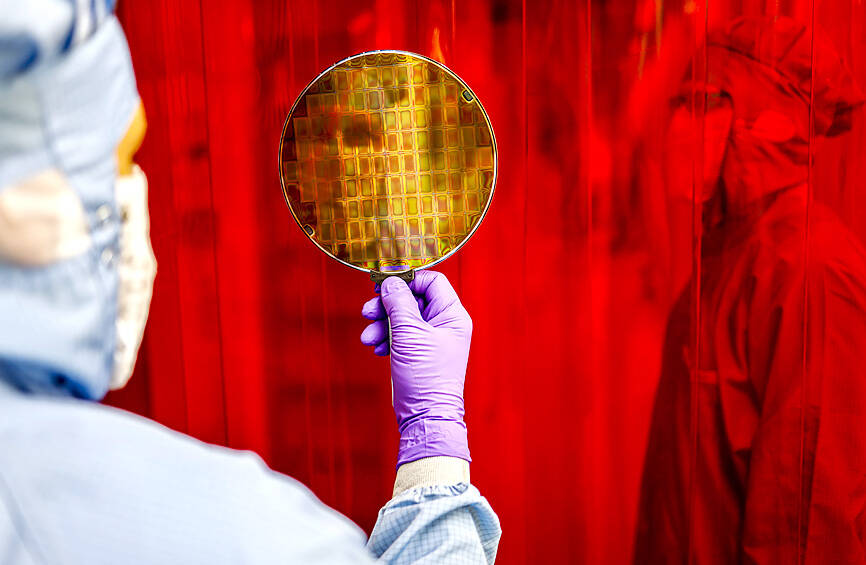The Executive Yuan yesterday approved a plan to spend NT$300 billion (US$9.27 billion) in the next 10 years to fund innovations that would combine the use of generative artificial intelligence (AI) systems and chips.
The “Chip-driven Taiwan Industrial Innovation Plan” was briefed to Cabinet members by the National Science and Technology Council and approved at the weekly Cabinet meeting.
“With the rise of generative AI systems, chips have driven the development of global technology industry and have become motivation for businesses seeking innovation,” Cabinet spokesperson Lin Tze-luen (林子倫) cited Premier Chen Chien-jen (陳建仁) as saying, adding that the development of chips would be the key technology for the “next industrial revolution.”

Photo: EPA-EFE
The council told the Cabinet that the plan is to be enforced through cooperation with officials from the Ministry of Economic Affairs, the Ministry of Education, the Ministry of Health and Welfare, the Ministry of Agriculture, the Ministry of Digital Affairs and the National Development Council, Lin said.
The plan also lays out strategies to meet the rising challenges in developing next-generation chip technology, Lin said.
The government is to allocate a total of NT$300 billion from next year to 2033 to develop chip technology, with NT$12 billion budgeted for next year, Lin said.
The council at a news conference after the meeting said that the plan would ensure that Taiwan controls key technologies to design advanced chips, and enhances its design capabilities for such chips and accelerates heterogeneous integration of chip designs and interfaces.
The funding would be used to speed up the production of non-silicon-based wafers, as well as the development of chips smaller than 1 nanometer, 3D chip stacking technology and heterogeneous integrated packaging, the council said.
The funding would also be used to develop energy-saving applications with high computing power and frequency, it said.
“For next year’s budget plan, about NT$8 billion would be used to train and attract talent, while NT$4 billion would be used to attract overseas investment in projects combining the use of generative AI systems and chips,” National Science and Technology Council Minister Wu Tsung-tsong (吳政忠) said.
Separately, the Ministry of Justice and the Ministry of the Interior have stepped up their intelligence-gathering efforts to investigate any potential interference in the presidential and legislative elections in January through underground gambling and dissemination of fake news, Lin said.
The announcement was made after the Criminal Investigation Bureau on Wednesday raided a gambling operation in Changhua County operated by two Taiwanese brothers, who solicited funds over Facebook to bet on the presidential election.
Meanwhile, people who were allegedly affiliated with independent presidential hopeful Terry Gou (郭台銘) have been questioned by prosecutors on suspicion of purchasing personal information to use in Gou’s signature drive to appear on the presidential ballot.
“Police and prosecutors are scrutinizing vote-buying incidents reported nationwide. We are respecting investigations at the judicial system and do not have comments on any specific case,” Lin said.

CHAOS: Iranians took to the streets playing celebratory music after reports of Khamenei’s death on Saturday, while mourners also gathered in Tehran yesterday Iranian Supreme Leader Ayatollah Ali Khamenei was killed in a major attack on Iran launched by Israel and the US, throwing the future of the Islamic republic into doubt and raising the risk of regional instability. Iranian state television and the state-run IRNA news agency announced the 86-year-old’s death early yesterday. US President Donald Trump said it gave Iranians their “greatest chance” to “take back” their country. The announcements came after a joint US and Israeli aerial bombardment that targeted Iranian military and governmental sites. Trump said the “heavy and pinpoint bombing” would continue through the week or as long

TRUST: The KMT said it respected the US’ timing and considerations, and hoped it would continue to honor its commitments to helping Taiwan bolster its defenses and deterrence US President Donald Trump is delaying a multibillion-dollar arms sale to Taiwan to ensure his visit to Beijing is successful, a New York Times report said. The weapons sales package has stalled in the US Department of State, the report said, citing US officials it did not identify. The White House has told agencies not to push forward ahead of Trump’s meeting with Chinese President Xi Jinping (習近平), it said. The two last month held a phone call to discuss trade and geopolitical flashpoints ahead of the summit. Xi raised the Taiwan issue and urged the US to handle arms sales to

State-run CPC Corp, Taiwan (CPC, 台灣中油) yesterday said that it had confirmed on Saturday night with its liquefied natural gas (LNG) and crude oil suppliers that shipments are proceeding as scheduled and that domestic supplies remain unaffected. The CPC yesterday announced the gasoline and diesel prices will rise by NT$0.2 and NT$0.4 per liter, respectively, starting Monday, citing Middle East tensions and blizzards in the eastern United States. CPC also iterated it has been reducing the proportion of crude oil imports from the Middle East and diversifying its supply sources in the past few years in response to geopolitical risks, expanding

An Emirates flight from Dubai arrived at Taiwan Taoyuan International Airport yesterday afternoon, the first service of the airline since the US and Israel launched strikes against Iran on Saturday. Flight EK366 took off from the United Arab Emirates (UAE) at 3:51am yesterday and landed at 4:02pm before taxiing to the airport’s D6 gate at Terminal 2 at 4:08pm, data from the airport and FlightAware, a global flight tracking site, showed. Of the 501 passengers on the flight, 275 were Taiwanese, including 96 group tour travelers, the data showed. Tourism Administration Deputy Director-General Huang He-ting (黃荷婷) greeted Taiwanese passengers at the airport and